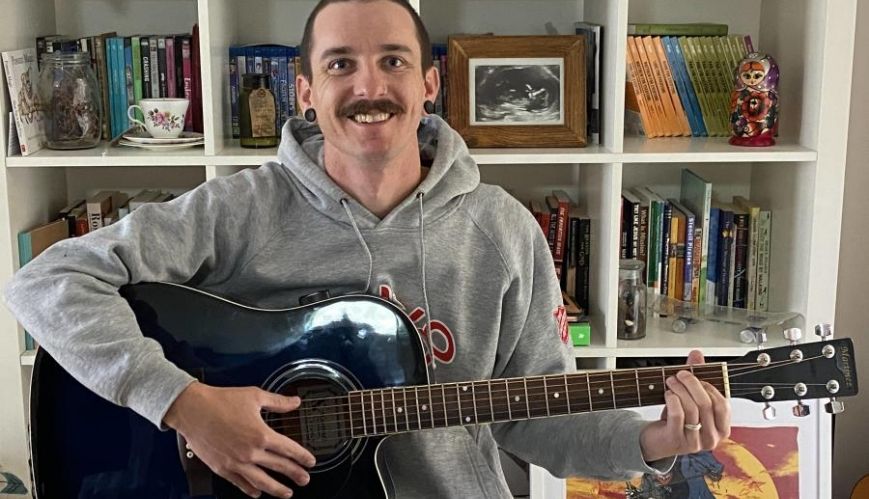Youth workers getting in tune to provide extra support

Youth workers getting in tune to provide extra support
29 June 2020
Auxiliary-Lieutenant Daniel Smith learned guitar alongside some of the young people supported by The Salvation Army’s youth homelessness services in Western Australia.
Western Australia has been one of the first states to dramatically ease restrictions after the outbreak of COVID-19 earlier this year. For The Salvation Army’s youth homelessness services in the state, the next step will be to ensure the wellbeing of the young people they support.
When coronavirus hit and social distancing and isolation restrictions were introduced, The Salvation Army’s youth homelessness services in Western Australia immediately moved to connect with their young people in ways that were relevant.
“Initially we started by contacting all the young people we worked with, and got a baseline assessment of what access they had to technology and resources, and what their needs, wants and interests were,” said Guy Rees, Senior Manager, Metropolitan Services, which works with young people from across the state who are experiencing homelessness, in out-of-home care or transitioning to live independently.
“Because we were unable to carry on with the one-to-one, face-to-face case management that we have been doing for a number of years now, we tried to ensure that the young people felt connected, supported and were also still being able to look at developing new skill sets and building on existing skills that they had.”
The result of their survey of young people led them to introduce a weekly interactive newsletter and set up a number of online connection points where people could learn how to cook, learn to play the guitar, or play games with each other virtually. The team created self-care packs for young people who may have been struggling with isolation. These included colouring packs, activity books, puzzle books, face masks, Easter eggs, sensory/fidget toys, hand moisturiser etc.
.jpg&width=300&height=450) Online cooking classes were one way The Salvation Army’s youth homelessness service in Western Australia stayed connected with its young people during COVID-19.
Online cooking classes were one way The Salvation Army’s youth homelessness service in Western Australia stayed connected with its young people during COVID-19.
Most importantly, caseworkers continued to maintain one-on-one support through telephone or video calls.
“We started doing a ‘walk and talk’,” said Guy. “We would encourage our young people to get out and exercise, and that’s when the youth worker would make contact with them so they would walk and talk and describe their walk, what they’ve seen, what they observe and how they’re feeling.”
Covid Chaplaincy
For Auxiliary-Lieutenant Daniel Smith, a dedicated chaplain to the service, ministering through an international pandemic has created a unique set of ‘firsts’.
“It [COVID-19] has taken away my usual contact with young people,” he said of the challenges in maintaining connection.
Having wanted to learn to play the guitar for a long time, he jumped at the opportunity to learn with a number of young people connected with the Army’s youth services who expressed an interest to learn something new during the pandemic isolation period.
“It’s been a challenge, especially doing it over the internet,” he said. A video of him talking about what it’s been like to learn and where he found good online resources received a lot of views through his chaplaincy newsletter. Other videos that have been popular among the young people are of another youth worker demonstrating how to cook spaghetti bolognese and the whole youth services team lip-syncing the song “I’ll be there for you” from the 1990s television sitcom Friends.
Daniel said the pandemic was also an opportunity for him to support the youth workers as they worked hard to ensure the wellbeing of the young people connected with the service. He said the feedback he has received from the youth workers who remained in contact with young people was that the change in pace that coronavirus brought, gave them more time to think about life and spirituality: “For some it has been the break from what was normal, to reflect on what their priorities are and what’s important to them. For some, that’s been reconnecting with faith or spirituality.”
Long road ahead for some
While many of the young people connected with the service found a level of resilience to cope during the coronavirus restrictions, Guy said that some really struggled.
“The majority of the young people we work with have significant trauma histories; they’ve all had tough times in their lives and this isolation and lack of face-to-face contact has really brought a lot of the mental health issues to the surface. Young people found themselves in those really dark places and were not able to reach out and have that support that they’ve relied on for a number of years, so it was very difficult for some of them.”
While this means those young people will have further challenges to tackle with their case-workers now that they can again meet face-to-face, Guy hoped that “we can help them work through the core of those mental health issues and help them move forward to a better place than they were.”
The service is looking to be creative in the way it operates post COVID-19. It will continue to operate a number of its online social groups and work with young people who are stepping up to facilitate them. The ability to maintain a digital presence will enable the service to remain connected with more young people as they transition to independent living.